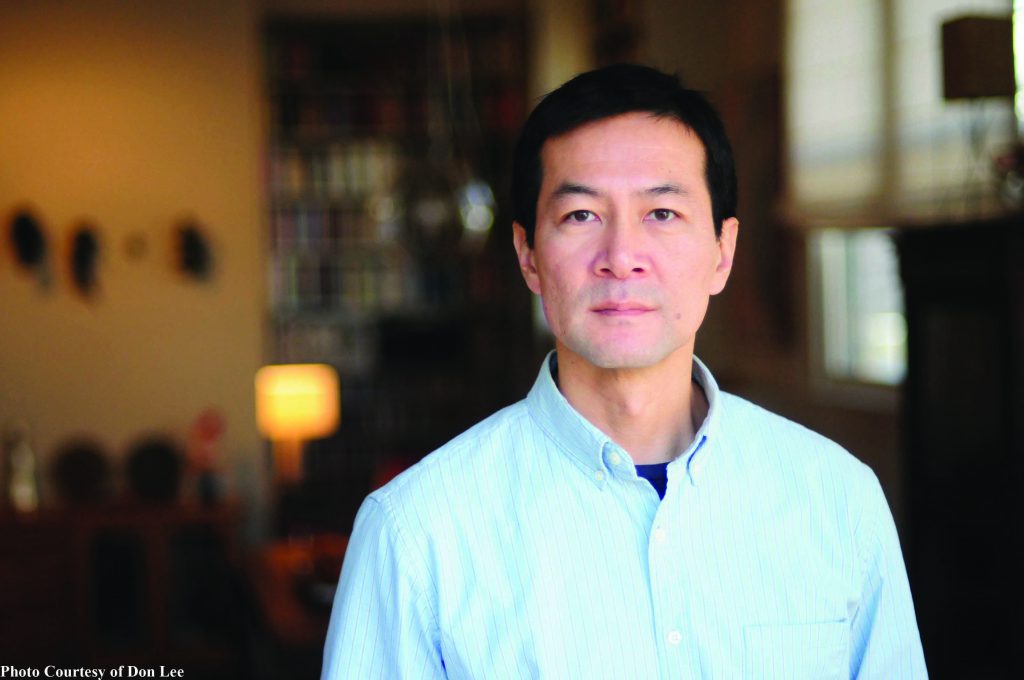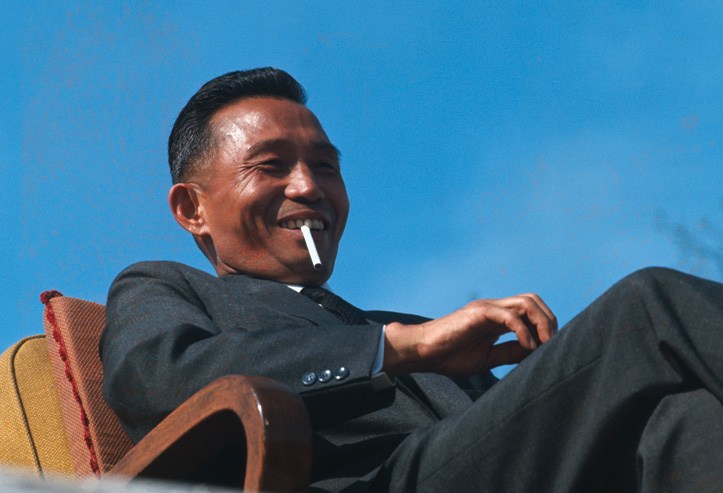Don Lee’s highly praised fourth book, The Collective, about three Asian American artists, is his most personal yet.
by VIVIEN KIM THORP
Transnational adoption, interracial dating, the ephemeral nature of friendship and the pitfalls of pursuing a life in the arts—these are just a few of the topics that author Don Lee covers in his latest book, The Collective.
A tale of three Asian American would-be artists, the novel is a classic bildungsroman, set in Minnesota and later Massachusetts. Since its publication last July, The Collective’s accolades have included a glowing review in The Boston Globe (a “hilarious and winning story”) and a nod from the New Yorker (a “smart” and “subdued third novel”). And an NPR correspondent named it part of the new “collegiate canon,” alongside Jeffrey Eugenides’ recent bestseller, The Marriage Plot.
The novel begins when Joshua Yoon, a 38-year-old writer, commits suicide by throwing himself into the path of a car. It’s September of 2008, and one of his only friends, fellow writer Eric Chang, is left to distribute his estate. As Eric deals with Joshua’s meager belongings, he begins to reminisce, tracing their friendship back 20 years, to their freshman year of college in 1988.
Published by W. W. Norton, The Collective is Lee’s fourth book. His first, Yellow, a collection of short stories, was published in 2001. Two novels, Country of Origin and Wrack and Ruin, followed. Of the four, The Collective is the most personal work. Lee insists it’s not autobiographical, although his characters’ lives do often parallel that of the real-life Don Lee. Told in the first person, the novel is set both at Macalaster College in St. Paul, Minn., where Lee taught writing from 2007 to 2008, and in Boston and Cambridge, Mass., where he lived for 23 years. Like Lee, Eric has a sister four years his senior and spends years as the editor of a literary journal. And like Lee, the narrator’s mother dies when he is only 30 years old, an event Lee says, that forever changed his life.
In the novel, Joshua, Eric and Jessica Tsang, an aspiring painter, wade into adulthood, reuniting post-graduate school, in a house in Cambridge. Amongst the stories of thwarted love, youthful ambition and sex (of which there is a great deal), there is a steady flow of Asian American cultural references, from debates on interracial dating (Twinkies and rice chasers) to a discourse on the nuances of Asian hair: “different from Caucasian hair—thicker, heavier, coarser, harder to cut, more prone to cowlicks.”
Plagued by requests for Chinese restaurant recommendations and stereotypes like Suzie Wong and Long Duck Dong, Eric and Joshua organize their motley crew of Asian Pacific Islander writers, painters and photographers into the 3AC, or the Asian American Artist Collective, from which the novel’s name is derived:
“We would instigate a grassroots movement, Yellow Power redux, through our art. We’d celebrate our heritage in our work and foster unity, and we’d help shape our generation’s literary and artistic attitudes.”
Lee is a third-generation Korean American. His father was born in Honolulu, his mother in Seoul. His father worked for the U.S. State Department, and Lee was born in Tokyo, growing up between Korea, the U.S. and Japan.
Lee says he learned to speak Japanese, before Korean or English, from the family’s maid. It wasn’t until his dad was relocated to Seoul that it dawned on him that he wasn’t from Japan. After graduating from an international high school in Tokyo, Lee set out for UCLA with plans to be a mechanical engineer. “I had this crazy idea I’d eventually get a Ph.D. in physical oceanography and then build and pilot underwater submersibles,” he says. Instead, bored with his physics and chemistry classes, he took a creative writing class. “Finding that verbal outlet enlightened me,” he says. One creative writing class led to another. And instead of plumbing the ocean depths, Lee graduated with an English literature degree.
In his novels and stories, Lee’s characters are often of Asian Pacific Islander background, though race itself is not necessarily the main focus. However, in The Collective, the issue is front and center. Members of 3AC can’t avoid their race, even if they want to. And racial issues—sometimes real and sometimes imagined—have great impact on their lives. In fact, part of the premise is just that—how race, particularly from the view of an artist, can’t be escaped.
It’s a topic that Lee, who has taught writing for years, says comes up often. On the one hand, it’s a relief for many young artists to feel that they can write about what is important to them, which doesn’t always mean writing about race. “But then others argue that avoiding a subject so obviously close to you and who you are means you are in denial and being cowardly,” he says. In the book, he plays both sides of the argument. “The experience I am talking about [in The Collective] is a very special experience, that of being an Asian American artist,” Lee says.
Since 2009, Lee has lived in Philadelphia, where he’s the director of the MFA program at Temple University. During the academic year, he teaches. And in the summer, he writes and spends time outdoors. In fact, Lee does not seem much at all like what one imagines a 53-year-old professor to be. Along with biking and hiking, he’s obsessed with windsurfing, and he plays alt-country songs on his guitar, which he learns by watching YouTube.
A self-proclaimed late bloomer, Lee published his first book at the age of 41. After earning his MFA from Emerson College in Boston, he spent 19 years editing the school’s literary journal, Ploughshares. “I was dawdling, writing maybe one story a year,” he says. “I never put a book together because I was afraid—what if I actually went for it and I failed?”
However, he didn’t fail. He stuck it out, flirting only briefly with an alternate career (as a therapist), and enduring the concerns of friends and family members who wished he’d quit writing for a “real” job. The effects of his perseverance are a laundry list of awards. This January The Collective won the 2013 Asian/Pacific American Awards for Literature for adult fiction. His other novels and short stories have earned him a Pushcart Prize and O. Henry, American Book and Edgar awards.
Post-Collective, Lee plans to table ethnic identity issues for a while.
“I measure success by challenging myself,” he says. “It’s important to do something a little different each time.” For now, he’s focused on his fifth book, a short novel about an indie singer-songwriter. “After that, I’ll work on my sixth book, and keep going for as long as I can.”
This article was published in the March 2013 issue of KoreAm. Subscribe today! To purchase a single issue copy of the March issue, click the “Buy Now” button below. (U.S. customers only. Expect delivery in 5-7 business days).







